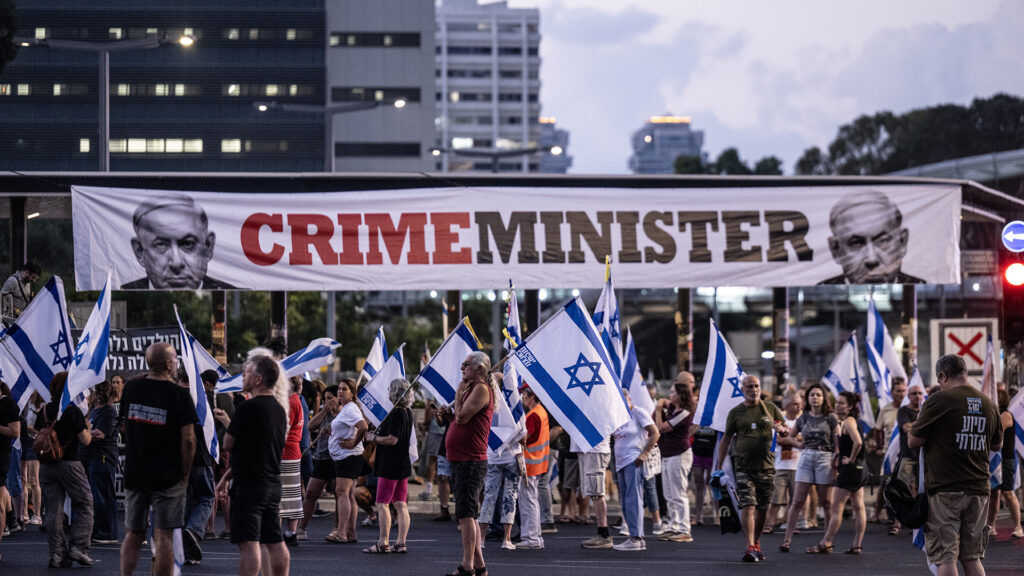10/8/2024–|Last updated: 10/8/202411:48 AM (Mecca time)
In one of the recent massive demonstrations in Tel Aviv demanding a swap deal and early elections to replace Prime Minister Benjamin Netanyahu’s government, one demonstrator raised a banner reading, “Who are we without them?” In reference to the prisoners held by the Islamic Resistance Movement (Hamas) in Gaza. Another sign read: “Give me one excuse to raise children here.”
Merav Zonszin, senior analyst for Israeli affairs at the International Crisis Group, said in an article published by the New York Times that these messages sum up questions that many Israelis are asking themselves, a year after “the longest war in Israel’s history,” such as “What is the value of a Jewish homeland if Wasn’t it his priority to save the lives of his fellow civilians who were kidnapped from their homes?
In her article from Tel Aviv, the writer went on to ask: Will I feel safe again? What kind of future awaits me here if the only vision our leaders offer is endless war?
She said that Israel is plunged into an existential crisis after the Al-Aqsa flood on October 7, 2023, describing it as a “shrinking” state: tens of thousands of its citizens have been displaced from the northern towns and agricultural settlements (kibbutzim) and the southern border villages, while it is waging a multi-front war that does not… You keep getting more and more distressed.
Departure or civil disobedience
The writer added that thousands of Israelis who have resources chose to leave Israel after October 7 of last year, while others are considering or planning to emigrate. Several thousand others also took to the streets week after week, and have since then engaged in civil disobedience and protests against the judicial reform proposed by the Netanyahu government.
She explained that one of the manifestations of the internal crisis became clear last month, when pictures showed former Army Chief of Staff Dan Halutz being forcefully removed by the police from the street, in a sit-in in front of the Prime Minister’s private residence, and pictures of prisoners’ relatives being subjected to violence by law enforcement officers.
The writer described the ongoing war as a battle completely separate from the Israeli-Palestinian conflict, and from the Palestinians themselves in the West Bank, Jerusalem and Gaza, “as if they do not breathe the same air that we breathe in Israel.”
She pointed out that the anger simmering in the Israeli street is limited, to a large extent, to the government’s failure to rescue the prisoners and not to the indiscriminate destruction of Gaza and the killing of more than 40,000 Palestinians, most of whom are civilians.
According to the article, few are protesting against Israel’s excessive use of force, and the writer pointed out that the Palestinians are waging a battle for their existence.
Underestimating the suffering of the Palestinians
The chief analyst for Israeli affairs at the International Crisis Group criticized what she called the Israeli underestimation of the suffering of the Palestinians, whether consciously or not, and described it as one of the most tangible and disturbing features of life in Israel since the Al-Aqsa flood.
Although this neglect or disdain existed long before that, it has now become more apparent and influential. In the writer’s opinion, it is precisely this “indifference” that enabled the extreme right to control Israeli politics unchallenged.
She also said that the unifying principle in Israel today, as formulated by the right-wing parties in power, is – from her point of view – Jewish control and hegemony, and living by the sword.
She concluded as she began: What does it mean, then, to live in a country whose leaders have made the well-being of its citizens secondary to the political future of their leaders and their exercise and consolidation of political power and excessive military force? How can Israelis explain the selective application of the law where the police refuse to arrest settlers who attack Palestinians, and arrest those who demand a deal to release prisoners despite their commitment to the law?

